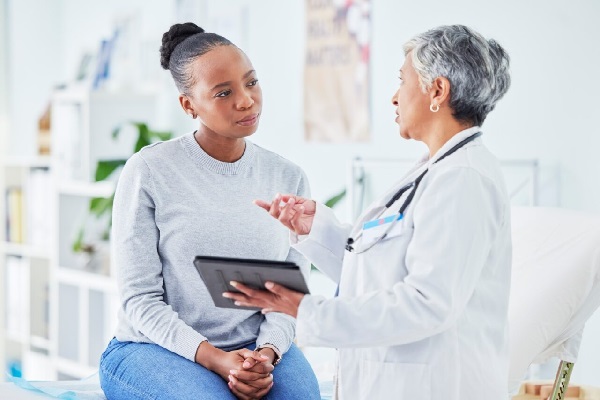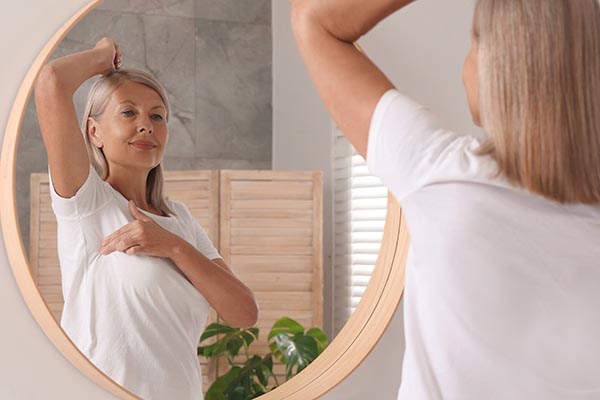Your Partner in Breast Health
Dedicated breast care specialists offer the care, guidance and support you need at all stages of your breast care journey.
Breast Care & Wellness
Compassionate Care for Breast Health, Breast Cancer & Breast Diseases
Many people will experience some type of breast condition or change to their breasts in their lifetime. Fortunately, most of these conditions and changes aren’t breast cancer. In fact, 80% or more of these breast conditions are benign (noncancerous).
However, many benign breast conditions and changes still require expert care and management.
Full-Service Breast Care Treatment
Our comprehensive breast health program provides personalized care for all breast conditions. This includes advanced diagnostic and treatment services for conditions and diseases like breast lumps and cysts as well as radial scars and complex sclerosing lesions. Radial scars and complex sclerosing lesions both look like scars under a microscope and involve hardened, abnormal breast tissue.
Whether you’re due for your annual mammogram, you have a concern about your overall breast health, or you’ve been referred to us by your primary care or another provider, you'll receive breast care that meets our, and your, high standards.
Schedule Your Mammogram at Baystate Health
People over 40 do not need a referral for a screening mammogram. You can call us or request an appointment online at one of our eight locations.
Related Breast Care Services

Know Your Breast Cancer Risk

Examine Your Own Breasts
A Team Approach to Breast Care
Our breast care team members are your partners in breast health. No matter which of our breast care centers you visit, you can expect the same dedication comprehensive, compassionate breast care tailored to your needs.
Your Baystate Health breast care team includes:
- Breast surgeons
- Medical oncologists
- Nurse navigators
- Plastic surgeons
- Radiation oncologists
- Radiologists
In addition to our breast care experts, we partner with people across Baystate who help us meet additional physical, emotional, and even spiritual needs that could come up while you’re receiving breast care. These team members can include behavioral health specialists, clergy, nutritionists, and more.
Together with colleagues throughout the Baystate Health system, we work to ensure you get the advanced breast care you need. This sometimes includes working with related specialties like:
Our nurse navigators are available every step of the way

Our nurse navigators help you get answers to your questions about things like your appointments, treatments, or overall breast health.
Answers to Your Breast Care Questions
You want to look for something that seems new or different from what you’ve felt or seen previously.
If you see or feel something during your regular self-check that’s different than it was the previous month, start by looking again in two or three days to see if it’s still there. Changes in your breasts that go away in a day or two are common because of hormone levels during menstrual cycles.
But if the changes are still there in a few days, call your provider or call us at 413-794-8899 to schedule an appointment to get it checked out.
However, you should let your provider and mammogram imaging specialist know if you have concerns. You should also tell them, before you have your mammogram, if there’s any chance you could be pregnant.
You can learn more about your genetic risk for breast cancer or benign (noncancerous) breast disease through our Family Cancer Risk Program.
Screening mammograms are a vital tool for detecting breast cancer. However, a mammogram isn’t right for everyone.
Talk to your provider about your concerns. They can help you determine if there is something they should investigate. They can also offer screening tips and ways to help lower your risk of breast disease.
If you have regular periods, we recommend scheduling your mammograms for the week before you expect to get your period, when your breasts are less likely to be swollen and firm.
Be sure to tell your mammogram imaging specialist if you experience any pain during your mammogram.
When you turn 40, you should ask your provider about your risk for breast cancer. Depending on your personal and family history with breast cancer or other cancers, you may need to start having a regular mammogram then.
You should have your first mammogram no later than age 50. After that, schedule one every one or two years for as long as your provider recommends, based on your health and your personal preferences.
According to the Centers for Disease Control and Prevention (CDC), people with dense breasts are at greater risk for breast cancer.
Dense breasts are high in both fibrous tissue and glandular tissue. Fibrous tissue holds breast tissue in place, and glandular tissue includes the structures that make and carry breast milk to the nipple. Fibrous and glandular tissues look white on a mammogram. Breast tumors also look white on a mammogram, which means these tissues can hide small breast tumors.
About half of all women 40 and older have dense breasts. You are more likely to have dense breast tissue if you:
- Have a lower body weight
- Are on hormone replacement therapy
- Are pregnant or breastfeeding
A mammogram can also show if you have dense breasts. If you have dense breasts, talk to your provider about your risk for breast cancer and benign (noncancerous) breast disease. Together you'll decide if you need additional testing, such as a breast ultrasound or breast magnetic resonance imaging (MRI).
Breast Care Articles
-
Healthy Aging
![two menopause-aged women walking in nature]()
Navigating Menopause: Signs, Stages, and Symptom Relief
-
Wellness & Prevention
![Over-the-Counter Birth Control Pills-What You Need to Know]()
Over-the-Counter Birth Control Pills: What You Need to Know
-
Wellness & Prevention
![What Are Fibroids_ Treatments and Options for This Common Issue]()
What Are Fibroids? Treatments and Options for This Common Issue
-
Wellness & Prevention
![a woman in a plain white tshirt conducting a breast self exam in a mirror]()
Signs of Breast Cancer (That Aren't Lumps): Skin & Nipple Changes
-
Coping with Illness
![a woman consulting with her doctor on breast cancer surgery options]()
Lumpectomy vs. Mastectomy: How to Choose a Breast Cancer Surgery
-
Your Healthcare
![Reasons for Callback After Mammogram]()
Don't Panic! Most Common Reasons for Callback After Mammogram
-
Coping with Illness
![Questions to Ask Breast Cancer Doctor]()
Advice from Breast Cancer Doctors: Questions to Ask After Diagnosis
-
Your Healthcare
![Genetic Testing for Breast Cancer]()
When Should You Get Genetic Testing for Breast Cancer?
-
Wellness & Prevention
![What are Different Types of Breast Cancer_ Plus Treatment Options]()
What are Different Types of Breast Cancer? Plus Treatment Options
-
Wellness & Prevention
![A woman on a yoga mat performing a bridge pose]()
What are Kegels? Learn How Kegel Exercises Help with Incontinence
Back to Top











